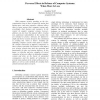Free Online Productivity Tools
i2Speak
i2Symbol
i2OCR
iTex2Img
iWeb2Print
iWeb2Shot
i2Type
iPdf2Split
iPdf2Merge
i2Bopomofo
i2Arabic
i2Style
i2Image
i2PDF
iLatex2Rtf
Sci2ools
HICSS
2016
IEEE
2016
IEEE
Perverse Effects in Defense of Computer Systems: When More is Less
With computer security spending on the rise, organizations seem to have accepted the notion that buying more—and more expensive—defenses allows them to better protect their computer systems and, accordingly, their business and customers. In the context of complex computer systems, however, defenses can also have the opposite effect, creating new, unforeseen vulnerabilities in the systems they are intended to protect. Advocacy for defense-indepth and diverse security measures has contributed to creating this “more is better” mentality for defending computer systems which fails to consider the complex interaction of different components in these systems, especially with regard to what impact new security controls may have the operation and functionality of other, pre-existing defenses. In this paper, we describe and give examples of several categories of perverse effects in defending computer systems and draw on the theory of unintended consequences and the duality of technology...
Biometrics | HICSS 2016 |
Related Content
| Added | 03 Apr 2016 |
| Updated | 03 Apr 2016 |
| Type | Journal |
| Year | 2016 |
| Where | HICSS |
| Authors | Josephine Wolff |
Comments (0)

